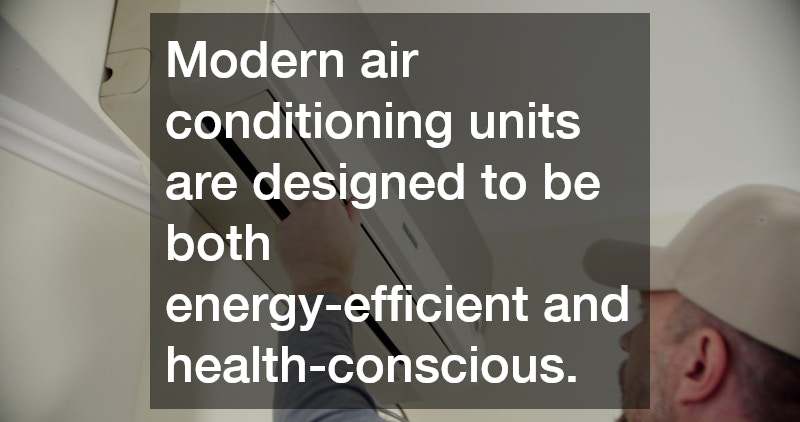Clean, breathable air is fundamental to a safe and comfortable home. Indoor air can become stale or polluted over time due to dust, allergens, mould spores or chemical particles from household products. With people spending a significant amount of time indoors, maintaining high indoor air quality has become essential for health and wellbeing.
Modern solutions can dramatically improve this air quality, with systems designed to filter, ventilate and balance humidity. One such solution lies in proper air conditioning installations, which contribute not only to temperature regulation but also to a healthier living environment. The right system can remove contaminants, maintain air flow and reduce exposure to airborne particles.
This article explores how installing the right air conditioning system can impact indoor air quality and what homeowners should know when considering such an upgrade.
Air Circulation & Ventilation Matter
Stale indoor air often results from poor ventilation. Without a steady exchange of indoor and outdoor air, pollutants build up over time. These may include volatile organic compounds from paints and furniture, moisture from cooking and showering or even carbon dioxide from breathing.
Air conditioning systems support air circulation by moving air through different rooms and extracting stale air. Split systems and ducted units, when properly installed, distribute air evenly, reducing pockets of stagnant air. More advanced systems even bring in filtered outdoor air while expelling used indoor air.
In this way, they can assist in reducing airborne irritants. This is particularly important in homes with limited natural airflow, sealed windows or tight insulation. A well-installed system can compensate by ensuring consistent and clean ventilation.
Filtration Systems & Pollutant Removal
Airborne particles are among the most common causes of poor air quality. Pet dander, pollen, mould spores and dust mites can trigger allergies, asthma or other respiratory conditions. An efficient air conditioning system features built-in filters that trap these contaminants before they circulate throughout the home.
The quality of these filters matters. HEPA filters and multi-stage filtration options can capture even finer particles. When paired with routine maintenance, these filters remain effective at keeping harmful matter out of the air. In households with young children, elderly residents or those with compromised immunity, this added layer of protection makes a measurable difference.
Humidity Control & Mould Prevention
Excess humidity creates an ideal environment for mould and mildew, which contribute significantly to indoor air pollution. Bathrooms, kitchens and poorly ventilated spaces are especially susceptible. Mould spores in the air can cause respiratory discomfort and pose health risks over time.
Air conditioning helps regulate humidity by removing moisture from the air as it cools. While not a substitute for dedicated dehumidifiers, well-functioning systems maintain balanced levels that prevent dampness without over-drying the space. This plays a key role in discouraging mould growth and limiting bacteria that thrive in moist conditions.
It’s not just about moisture removal—consistent humidity levels also prevent wooden furniture and structural materials from deteriorating due to swelling or rot. Air conditioning installations completed by qualified technicians take humidity control into account, tailoring system features to the specific environment.
Maintenance, Filter Changes & System Hygiene
Once installed, even the best air conditioning system requires upkeep to continue improving indoor air quality. Filters become clogged over time, ducts may gather dust and condensate drains can harbour bacteria if left unchecked.
Routine servicing is crucial. Cleaning filters, inspecting ducts and ensuring all parts are functioning properly allows the system to operate efficiently. Many people underestimate the impact that maintenance has on indoor air quality. A neglected unit can circulate unfiltered air, push dust back into the home or spread bacteria.
Energy Efficiency & Health Benefits
Modern air conditioning units are designed to be both energy-efficient and health-conscious. Energy savings mean less strain on the household budget and reduced environmental impact, while features like air purification and ventilation control promote better breathing conditions.
There’s growing awareness about the link between indoor air quality and overall wellbeing. Clean air supports better sleep, reduces allergy flare-ups and improves concentration and mood. For people working or studying from home, these benefits are even more relevant.
Indoor air quality has a direct impact on comfort, health and safety within the home. From filtering pollutants to regulating humidity and improving ventilation, air conditioning plays a key role in keeping the air clean. However, this benefit relies heavily on proper design, installation and upkeep.
By investing in professional air conditioning installations, homeowners ensure their systems are set up to perform optimally. Clean air enhances daily life, protects vulnerable household members and supports long-term wellness. In an era where indoor environments are central to how we live and work, these benefits make a strong case for quality installation and care.
Whether renovating or upgrading an existing system, a focus on indoor air quality should always be part of the decision. With the right air conditioning system in place, every breath at home becomes cleaner, fresher and healthier.




